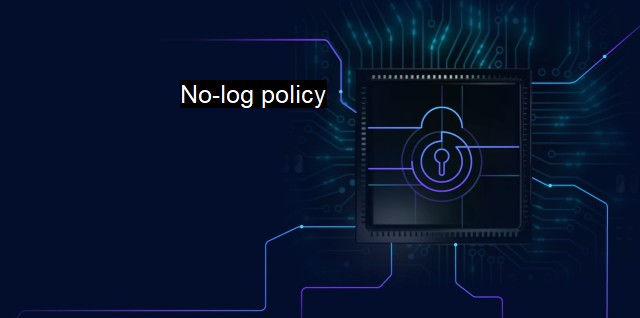What is No-log policy?
Protecting Users' Data Privacy: The Importance of No-Log Policy in Cybersecurity and Antivirus Services
In the world of cybersecurity and antivirus protections, a 'No-log policy' is a pivotal term designed to protect online users from intrusive tracking and unwanted data collection. Also known as a 'Zero-log policy', it assures a heightened sense of privacy and security to the customers utilizing VPN services, browsing software, and antivirus applications.To understand the specifics of a No-log policy, we first need to understand how data logging works. Whenever a user interacts with a digital service, whether it is an application, a website, or a downloadable program, a small digital footprint is left behind. This 'log' includes information like transaction data, personal usage behaviours, IP addresses, locations, browsing history, time-stamped usage records, and even more in certain cases.
These 'logs' are vital for service providers as they help inform iterations, updates, customer support, and feature implementation. it is also a depository of user's personal information that could be misused if the service providers decide to monetize the data by selling it to third-party advertisers, hackers, or even the government in some scenarios.
Here is where the 'No-log policy' comes into play. Companies adhering to this principle commit to absolutely no tracking, storing, or sharing of private user data. They design their system architecture in such a way that even they are refused access to users' private information. These stringent policies often delete each browsing session as it ends, securing the user's privacy.
Being the cornerstone in preserving online anonymity, a No-log policy is highly celebrated in the realm of Virtual Private Networks (VPNs). Through the VPN, the internet activity of a user can remain hidden from Internet Service Providers and other organizations attempt to navigate through the user's digital information. In many countries, laws do allow certain surveillance and data interception from the side of service providers for national security context. But a strict revered No-log-policy can ensure they have no data to turn over even if forced by a court of law.
Similarly, antivirus software, which often has deep access to personal computers and networks, adheres to No-log policy to assure users of their data security. As these antiviruses scan through the system to uncover nasty viruses or malicious content, they could siphon off personal data if a No-log policy isn't religiously followed.
Just the proclamation of following a No-log policy by a company is not enough. In reality, some companies may only engage in partial or pseudo No-log policies where they may collect certain 'non-identifiable' user data. Users should look out for independent audits done by a reputable third party. These audits cross-verify a company's No-log claims ensuring transparency.
A common misconception is that No-log policy is related to anonymity over the internet. While in scope they are related, but they are not the same. ‘No-logs’ contrasts more specifically to what your antivirus or VPN keeps track of rather than at maintaining complete anonymity over the internet.
The No-log policy doesn't necessarily equate with the illegality of activities. Despite the policy, most countries have cybercrime laws, and illegal activities done over the internet can still be punishable by law.
The No-log policy marks the safeguard to internet freedom, a response to the increasing data surveillance and shrinking online privacy. It is a commitment from security service providers be it VPN or antivirus solutions to ensure they do not monitor, track or store their customer’s activities. In an era where consumer data is hailed as the new oil, users must understand and verify that their chosen platforms truly uphold the No-log policy to heart.

No-log policy FAQs
What is a no-log policy?
A no-log policy is a practice implemented by cybersecurity and antivirus companies to ensure that they do not collect or store any user data or activity logs. This means that any information about the user's online activity is not recorded or stored, ensuring maximum user privacy and security.Why do cybersecurity and antivirus companies have a no-log policy?
Cybersecurity and antivirus companies have a no-log policy to ensure that they do not unintentionally collect sensitive user data, such as passwords or banking information, and to protect user privacy. By not collecting or storing any user data, these companies can ensure that user information remains secure and cannot be accessed by hackers or other malicious actors.What are the benefits of a no-log policy for users?
The benefits of a no-log policy for users include enhanced privacy and security, as their online activity cannot be tracked or monitored. Additionally, a no-log policy ensures that personal information, such as passwords and browsing history, cannot be accessed by third parties, protecting users from identity theft or fraud.What should users look for when choosing a cybersecurity or antivirus provider with a no-log policy?
When choosing a cybersecurity or antivirus provider with a no-log policy, users should look for a company that is transparent about their data collection practices and clearly outlines their policy. In addition, users should consider the provider's reputation and reliability, and look for independent reviews or third-party certifications that verify their commitment to user privacy and security.| | A | | | B | | | C | | | D | | | E | | | F | | | G | | | H | | | I | | | J | | | K | | | L | | | M | |
| | N | | | O | | | P | | | Q | | | R | | | S | | | T | | | U | | | V | | | W | | | X | | | Y | | | Z | |
| | 1 | | | 2 | | | 3 | | | 4 | | | 7 | | | 8 | | |||||||